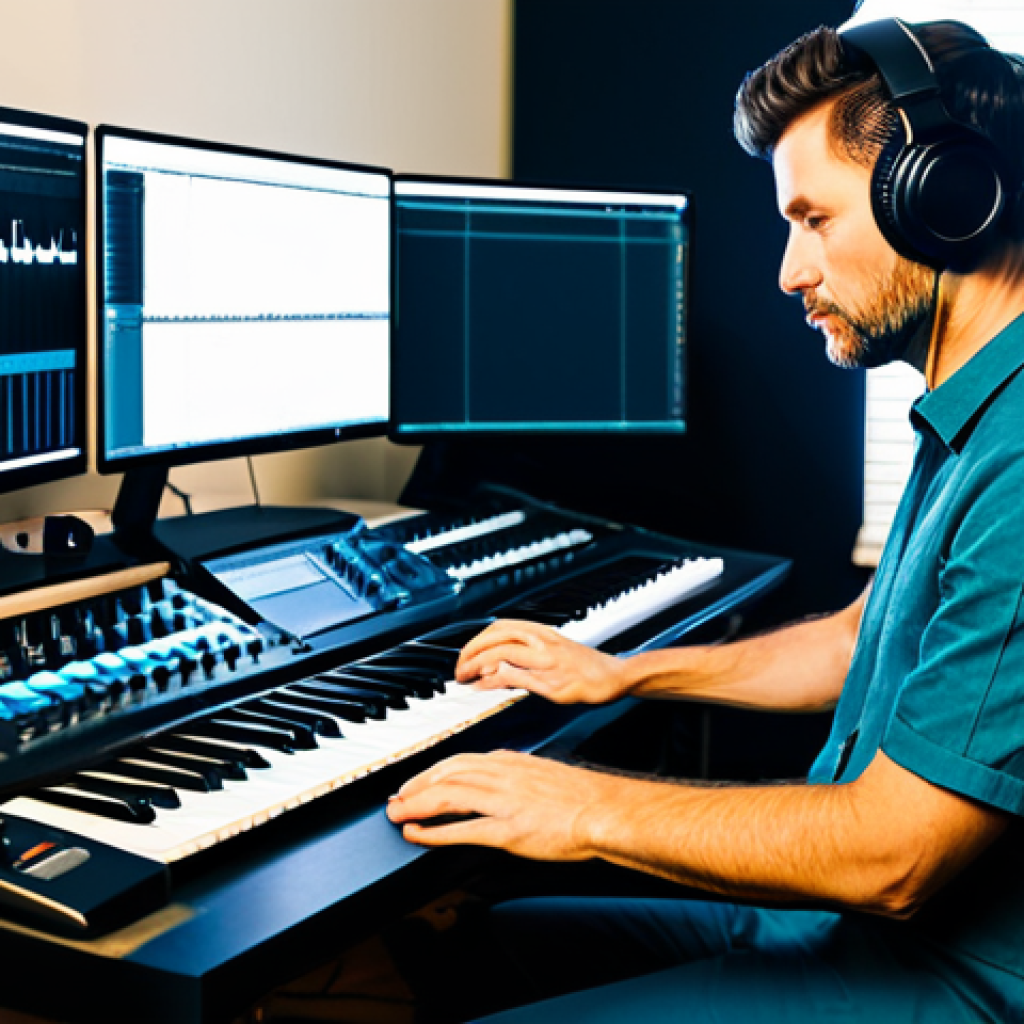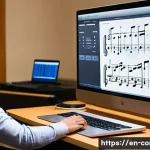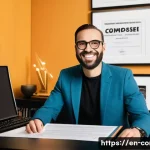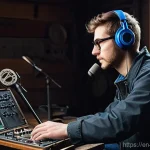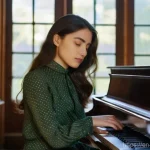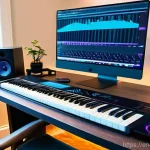Stepping into the world of music composition, I, like many others, initially wondered about the ultimate value of formal composer certifications. Do they truly open doors, or are they just a piece of paper in an increasingly digitized industry?
My personal journey quickly showed me that while foundational knowledge is absolutely crucial – you simply can’t fake genuine musicality – the real game-changer wasn’t found exclusively in a classroom, but within the vibrant, often chaotic, and incredibly supportive communities of fellow musicians.
It’s where raw ideas get refined, where collaborations ignite unexpectedly over a cup of coffee, and where you truly learn the practical ropes from people walking the same unpredictable path as you, far beyond any textbook.
We’re in an era where AI is constantly pushing the boundaries of what’s possible in music creation, yet human connection and unique artistic voice have never been more paramount.
The landscape is shifting dramatically towards creator-driven economies, with platforms like Patreon and Bandcamp allowing artists to directly connect and monetize, making that sense of belonging and direct feedback from your peers and audience invaluable.
It’s truly a brave new world for composers, far more fluid and less gatekept than ever before, but it demands adaptability and genuine engagement. Let’s find out precisely.
The Uncharted Territory Beyond Formal Credentials
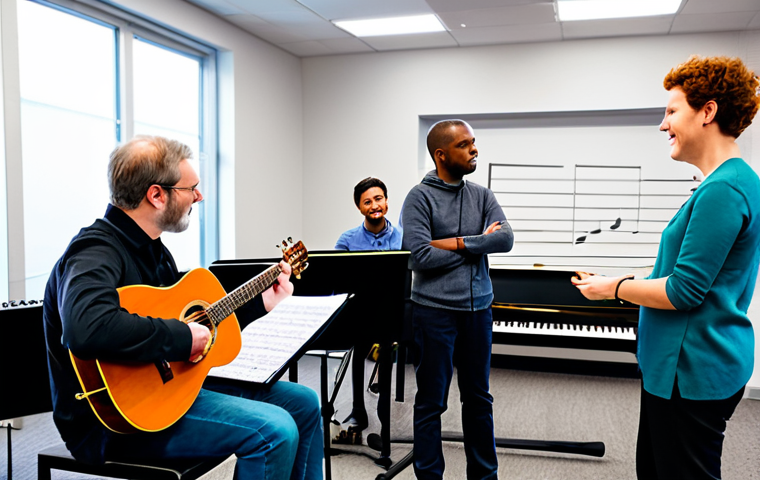
My journey into composition was less about accumulating certificates and more about navigating an ever-shifting landscape. I remember the thrill of learning classical theory, understanding harmony, and dissecting counterpoint, feeling like I was finally grasping the universe’s secret musical language.
But then, standing at the precipice of a professional career, I realized that while the foundational knowledge from my formal studies was undeniably crucial – you simply can’t innovate without understanding the rules you’re bending – the true value lay in its application and adaptation.
It’s like learning to read music; you can identify every note, but without the lived experience of performing in a shaky jazz club or the shared camaraderie of a late-night recording session, the soul of the music remains elusive.
I’ve often seen incredibly talented individuals, brilliant theorists even, struggle because they’d only learned *about* music, not how to *live* it. It’s a subtle but profound difference that dictates not just success, but genuine fulfillment in this incredibly challenging yet rewarding field.
The paper on the wall is a testament to effort, yes, but the real testament is the sound that moves someone, the collaboration that sparks new ideas, and the resilience you build from countless rejections and unexpected victories.
1. Bridging Theory and Practicality: My Own Learning Curve
I can vividly recall one of my first major projects outside of academia: scoring a short indie film. I had all the theoretical knowledge in my arsenal – orchestration techniques, leitmotif development, emotional arc mapping.
But what the textbooks didn’t tell me was how to deal with a director who changed their mind daily, a tight budget that meant using sample libraries instead of live orchestras, or the sheer anxiety of my music being the backdrop to someone else’s artistic vision.
It was in those moments, frantically searching online forums for advice on specific VST plugins or emailing a friend about a tricky sync issue, that the gap between theoretical knowledge and practical application became glaringly obvious.
This wasn’t about grades; it was about delivering a product, solving real-world problems, and learning to compromise without sacrificing artistic integrity.
The formal training provided the language, but the actual composition was a conversation, often a messy and unpredictable one, with the demands of the project and the creative visions of others.
This real-world pressure cooker taught me more about my own limitations and capabilities than any exam ever could.
2. The Imperative of Innate Musicality Over Endorsements
There’s a prevailing myth that a string of prestigious letters after your name somehow confers an inherent musicality. My experience has shown me the opposite.
While certifications can demonstrate diligence and a certain level of understanding, they don’t implant a unique voice or an intuitive grasp of rhythm and melody.
I’ve met certified composers whose music felt sterile and uninspired, and I’ve stumbled upon self-taught prodigies whose raw, unfiltered talent was breathtaking.
The most compelling music, I’ve found, almost always stems from a deeply personal place, an internal drive to express something ineffable. It’s the ability to truly *feel* the music, to understand its emotional weight and its storytelling potential, that truly matters.
This isn’t something you can quantify or certify. It’s a blend of innate talent, relentless practice, acute listening, and a willingness to pour your entire being into your art.
Certifications might open some initial doors, but it’s that authentic, undeniable musicality that keeps them open and allows your career to flourish.
Forging Connections: The Lifeblood of a Composer’s Journey
I honestly believe that if there’s one secret ingredient to surviving, and thriving, as a composer in today’s world, it’s community. When I first started out, I was a bit of a lone wolf, hunched over my DAW, convinced that my best work would emerge in isolation.
How wrong I was! It was through a local musicians’ meetup, of all places, that my entire perspective shifted. I met a film student who needed a score, a lyricist who opened my eyes to song structure, and even a seasoned video game composer who shared invaluable insights about middleware.
These weren’t formal networking events; they were genuine connections forged over shared passions and mutual struggles. The practical advice, the emotional support during creative blocks, and the sheer joy of collaborating with like-minded individuals became the backbone of my artistic practice.
This organic network provided opportunities that no job board ever could, and it offered a sense of belonging that is truly priceless in a field that can often feel isolating and competitive.
The strength of your network isn’t just about who you know, it’s about the genuine relationships you build and the collective wisdom you can tap into.
1. Peer-to-Peer Learning: An Unwritten Curriculum
My most profound learning experiences haven’t come from textbooks, but from conversations with fellow artists. I remember one particular instance when I was struggling with a complex orchestral arrangement.
I’d been stuck for days, staring at the screen, feeling utterly defeated. I casually mentioned it to a friend, another composer I’d met through an online forum, and within minutes, she’d offered a simple, elegant solution I’d completely overlooked.
It wasn’t about her teaching me a new theory; it was about her perspective, her ability to see the problem from a different angle because she’d encountered similar challenges herself.
These informal exchanges are where the real learning happens – sharing tips on navigating publishing agreements, discussing the nuances of mixing a specific instrument, or even just commiserating about creative burnout.
This collaborative environment often brings forth solutions that formal education might gloss over, as it’s rooted in direct, lived experience rather than abstract concepts.
It’s messy, it’s informal, but it’s incredibly effective because it’s driven by shared, real-world problems.
2. The Power of Collaborative Projects and Feedback Loops
There’s an undeniable magic that happens when creative minds converge. I’ve had the immense privilege of collaborating on projects that pushed my boundaries in ways I never thought possible.
From scoring an avant-garde dance piece to co-writing a jingle for a local business, each collaboration forced me to step outside my comfort zone, adapt my style, and communicate my ideas effectively.
The feedback loop in these environments is invaluable; it’s a safe space to test new ideas, receive constructive criticism, and refine your craft. It’s not about ego; it’s about growth.
I’ve learned to appreciate even the harshest feedback, understanding that it’s often a mirror reflecting areas where I can improve. This iterative process, constantly bouncing ideas off others and refining them based on diverse perspectives, is how truly compelling work emerges.
It’s a far cry from the solitary creative process I once envisioned, and it’s infinitely more rewarding.
Navigating the Digital Frontier: AI as a Creative Co-Pilot
The advent of AI in music composition has stirred up a lot of anxiety, and I understand why. The fear of being replaced, of our uniquely human creativity becoming obsolete, is a visceral one.
When I first started experimenting with AI tools like Amper Music or AIVA, I approached them with a healthy dose of skepticism, even trepidation. Would they strip away the soul of my music?
Would they make me irrelevant? What I discovered, however, was something far more nuanced and, frankly, exciting. AI isn’t here to replace human composers; it’s here to augment us, to act as a powerful co-pilot that can handle the more tedious or experimental aspects of the creative process.
I’ve found it invaluable for quickly generating chord progressions to break through writer’s block, exploring unusual timbres, or even getting basic backing tracks laid down so I can focus on the melodic nuances and emotional arc.
It’s not about letting the AI write the entire piece, but about leveraging its computational power to explore new avenues and speed up workflow, freeing up more of my mental energy for the truly creative, human-centric decisions.
1. Ethical Considerations and Creative Integration
As with any powerful new technology, integrating AI into composition comes with its own set of ethical considerations. It’s crucial to understand how the AI was trained, what datasets it used, and to ensure that its output isn’t simply regurgitating existing copyrighted material.
For me, it’s about using AI as a brainstorming partner, a source of inspiration, rather than a ghostwriter. I might use it to generate a hundred different melodic ideas, but the final selection, arrangement, and emotional shaping are entirely mine.
It’s about maintaining artistic ownership and integrity. I’ve learned to view AI as another instrument in my toolkit, a sophisticated one that requires careful handling and a clear understanding of its limitations.
The key is to blend its computational prowess with human intuition, emotional depth, and artistic intent. If used responsibly, AI can genuinely unlock new creative possibilities, but the human touch remains paramount in giving the music its unique soul.
2. Adapting Workflow for Enhanced Creativity
My workflow has undoubtedly transformed since I started integrating AI. Gone are the days of endlessly looping a short phrase, trying to coax out a new idea.
Now, I can feed a melodic fragment into an AI and quickly generate variations, harmonies, or even counter-melodies in seconds. This allows me to prototype ideas at an unprecedented speed, experimenting with different moods and styles without getting bogged down in the minutiae.
It’s a tool for rapid iteration, enabling me to explore more creative pathways in a shorter amount of time. I’ve found that this efficiency doesn’t diminish my creativity; it enhances it by freeing me from repetitive tasks and allowing me to dedicate more time to the truly expressive elements of composition.
It’s about working smarter, not necessarily harder, and focusing my energy on the aspects of music that only a human heart can truly imbue.
Direct Monetization in the Creator Economy: Forging Your Own Path
The traditional gatekeepers of the music industry are rapidly losing their grip, and honestly, it’s a liberating feeling. The rise of platforms like Patreon, Bandcamp, and even direct licensing marketplaces has fundamentally changed how composers can earn a living.
I remember the frustrating early days of trying to navigate publishing deals or hoping a record label would notice me. Now, the power has shifted directly into the hands of the creators, and it’s a truly exhilarating landscape.
My own experience with direct monetization has been transformative. It’s not just about selling music; it’s about building a direct relationship with your audience, understanding what they value, and creating a sustainable ecosystem around your art.
This direct connection fosters immense loyalty and provides a much more predictable income stream than relying on traditional royalties or commissions alone.
It empowers you to be an entrepreneur as much as an artist.
| Monetization Strategy | Description & Personal Takeaway | Best For |
|---|---|---|
| Patreon Subscriptions | Offers recurring income from dedicated fans. I found it fosters incredible community and direct feedback, allowing me to share works-in-progress and behind-the-scenes content. It’s about building a tribe. | Consistent income, fan engagement, exclusive content. |
| Bandcamp Sales | Excellent for direct album/track sales. You set your price, they take a small cut. I appreciate the control and the ability to offer physical merchandise alongside digital. Ideal for releasing independent albums. | Album/EP sales, merchandise, high artist cut. |
| Direct Licensing (e.g., Pond5, AudioJungle) | Licensing your music for film, TV, games, ads. This diversified my income streams significantly. It’s a volume game and requires a solid catalog, but the passive income can be substantial. | Passive income, broad reach for background music. |
| Private Commissions | Bespoke music for individuals or projects. This has been incredibly rewarding, allowing me to tailor my craft to specific visions. It requires strong communication and clear contracts. | High-value, customized projects, direct client relationships. |
1. Building Your Fanbase: The Art of Genuine Connection
In the creator economy, your audience isn’t just a number; they’re your patrons, your evangelists, and your most honest critics. I’ve learned that building a loyal fanbase isn’t about viral hits, but about consistent engagement and genuine connection.
Sharing my creative process, posting behind-the-scenes glimpses of my studio, and responding personally to comments and messages have been far more effective than any marketing campaign.
It’s about inviting people into your world, making them feel like they’re part of your journey. I regularly host Q&A sessions, livestream composition sessions, and even ask my audience for input on new track ideas.
This level of transparency and interaction creates an incredible bond, turning casual listeners into dedicated supporters who are invested in your success.
It’s a far cry from the aloof artist persona; it’s about being real, vulnerable, and deeply appreciative of those who choose to support your work.
2. Diversifying Income Streams for Sustainable Artistry
Relying on a single income stream in the arts is a recipe for anxiety. My personal strategy has been to diversify as much as possible, creating a robust financial foundation that allows me to focus on my art without constant financial pressure.
This means not just selling my music directly, but also exploring sync licensing opportunities for film and TV, offering custom composition services for games or commercials, and even teaching online workshops.
Each stream might be small on its own, but collectively, they create a reliable flow. This multi-pronged approach not only offers financial stability but also exposes me to different creative challenges, keeping my skills sharp and my perspective fresh.
It’s about building a resilient career that can withstand the inevitable ups and downs of the creative industry, ensuring that you can continue to make the music you love without burning out.
Cultivating Resilience: The Composer’s Indispensable Skill
If there’s one thing this career has taught me, it’s that resilience isn’t just a nice-to-have; it’s absolutely essential. I’ve faced countless rejections – from grant applications to pitch proposals – and been through periods of intense creative block where every note felt like a struggle.
There were moments, especially early on, when I seriously considered throwing in the towel. But what kept me going, what truly made the difference, wasn’t just passion for music, but the ability to bounce back, to learn from setbacks, and to continuously adapt.
This isn’t something you learn in a classroom; it’s forged in the crucible of real-world experience, often in solitude. It’s the quiet determination to sit back down at your instrument after a crushing critique, or the courage to start a new project when the last one fizzled out.
This emotional fortitude, combined with a pragmatic outlook, has been far more valuable to my career longevity than any specific technical skill I’ve acquired.
It’s the fuel that keeps the creative engine running.
1. Embracing Failure as a Stepping Stone
I used to dread failure, viewing it as a personal indictment of my abilities. Now, I see it as an invaluable teacher. My biggest breakthroughs often followed my most spectacular failures.
I remember working on a piece for a major competition, pouring months of my life into it, only for it to be utterly dismissed by the judges. I was devastated.
But after the initial sting wore off, I forced myself to revisit their feedback, to dissect where I went wrong, and to understand why the piece didn’t resonate.
That painful process led me to fundamentally rethink my approach to thematic development, ultimately making me a stronger, more insightful composer. Failure isn’t the opposite of success; it’s part of the path to it.
It’s about recognizing that every misstep is an opportunity to learn, to refine, and to grow. This shift in mindset from dreading failure to embracing it has been profoundly liberating.
2. The Imperative of Self-Care and Mental Well-being
The creative life can be incredibly demanding, often blurring the lines between work and personal life. I’ve learned the hard way that neglecting my mental and physical well-being inevitably leads to creative burnout and a significant dip in productivity.
Taking breaks, engaging in activities completely unrelated to music, spending time in nature, and prioritizing sleep aren’t luxuries; they’re essential components of a sustainable creative practice.
There was a period when I was working 16-hour days, convinced that more hours equaled more output, but I quickly found myself creatively bankrupt and emotionally drained.
Now, I schedule in “non-negotiable” time for exercise, reading, and simply unwinding. It’s counter-intuitive, perhaps, but stepping away from the studio often brings renewed perspective and fresh ideas.
Protecting your artistic well-being isn’t just about preserving your health; it’s about safeguarding the very source of your creativity.
Wrapping Up Our Creative Symphony
As we bring this exploration to a close, remember that the journey of a composer, or any artist, is rarely a straight path. It’s a rich tapestry woven from theoretical knowledge, practical application, invaluable community support, and the strategic embrace of new technologies. More than anything, it’s about the relentless pursuit of your unique voice, fueled by an unshakeable resilience. My own path has been incredibly messy, humbling, and exhilarating, and I wouldn’t trade a single note of it. Keep creating, keep connecting, and most importantly, keep nurturing that incredible, irreplaceable spark within you.
Helpful Resources for Your Creative Path
1. Connect with Your Tribe: Look for local musician meetups, online forums like KVR Audio or VI-Control, and Discord servers dedicated to composition and sound design. Genuine connections are gold.
2. Explore AI as a Co-Pilot: Tools like Amper Music, AIVA, and Google Magenta can offer inspiring starting points or help break creative blocks. Experiment with them to augment your human creativity, not replace it.
3. Build Your Direct Revenue Streams: Platforms like Patreon, Bandcamp, and various stock music libraries (e.g., Pond5, AudioJungle) empower you to monetize directly and build a sustainable income.
4. Never Stop Learning: Sites like MasterClass, Coursera, and even YouTube offer incredible insights from seasoned professionals. Continuous learning keeps your skills sharp and your ideas fresh.
5. Prioritize Your Well-being: The creative journey is a marathon, not a sprint. Schedule regular breaks, engage in non-music activities, and seek support when needed. Your mental and physical health are paramount.
Key Takeaways
The essence of a thriving creative career lies beyond formal credentials, deeply rooted in practical experience and innate musicality. Fostering a strong community and embracing collaboration are indispensable for growth and opportunity. Leveraging AI as a creative co-pilot can enhance workflow without compromising artistic integrity. Furthermore, diversifying income streams through direct monetization and cultivating unwavering resilience are crucial for sustainable artistry in the dynamic creator economy.
Frequently Asked Questions (FAQ) 📖
Q: Formal composition certifications – are they still genuinely valuable in today’s music world, or are they becoming obsolete?
A: You know, it’s a question I grappled with myself when I first dipped my toes into this world. I remember thinking, “Do I really need that piece of paper?” My honest take, having walked the path for a bit now, is that foundational theory and skills you might get from formal training are absolutely non-negotiable – you can’t fake musicality, right?
But the real magic, the stuff that truly moves the needle, happens outside those traditional walls. It’s in the late-night jam sessions, the chaotic but brilliant collaborations over lukewarm coffee, the sheer act of failing forward with people who get it.
That’s where you learn the gritty, practical side of the craft, far beyond any textbook. So, while a certificate might tick a box, the invaluable connections and practical experience forged within those vibrant communities are the true currency.
It’s less about a formal stamp and more about what you do and who you do it with.
Q: With
A: I pushing musical boundaries, how can human composers truly differentiate themselves and build a sustainable career? A2: This is a thought that keeps me up some nights, honestly.
AI’s incredible, no doubt, but here’s the thing: it still lacks that uniquely human spark. AI can generate complex harmonies or mimic styles, but it can’t bottle the raw emotion of a heartbreak, the unexpected burst of inspiration from a walk in the park, or the messy beauty of a collaborative “aha!” moment.
Our edge, our irreplaceable asset, is our unique voice, our lived experience, and our ability to connect on a deeply human level. The key, as I’ve found, is to lean hard into that authenticity.
Forget trying to compete with AI on speed or complexity. Instead, focus on crafting narratives, infusing your work with genuine feeling, and building direct, meaningful relationships with your audience.
That’s where platforms like Patreon or Bandcamp become absolute lifesavers – they let you nurture that direct connection, making your unique artistic fingerprint not just noticeable, but financially viable.
Q: The modern composition landscape feels incredibly fluid and less “gatekept” than ever. What’s your practical advice for navigating this dynamic new environment?
A: It’s exhilarating, isn’t it? But also, yeah, a little bit like being thrown into the deep end without a map. My biggest piece of advice, born from a lot of trial and error, is to embrace radical adaptability and genuine engagement.
Gone are the days when you waited for a big label or a gatekeeper to ‘discover’ you. Now, you are the label, the promoter, the artist, and the community builder.
This means being relentlessly curious, constantly learning new tech and trends, and most importantly, truly showing up for your audience and your peers.
Engage directly, ask for feedback, celebrate others’ wins, and share your own journey – the struggles and the triumphs. It’s about building a tribe, not just a discography.
Platforms like Patreon aren’t just for income; they’re for fostering that incredible sense of belonging. The more you pour your authentic self into these interactions and adapt to the ever-changing tools, the more you’ll find your unique space in this wild, wonderful new world.
📚 References
Wikipedia Encyclopedia
구글 검색 결과
구글 검색 결과
구글 검색 결과
구글 검색 결과
구글 검색 결과
